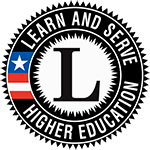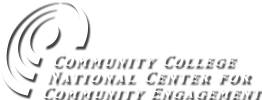1995-1998
SEAMS (Science, Engineering, Architecture, Math, and Computer Science) Project Reports


The Campus Compact National Center for Community Colleges built on its previous SEAMS project to advance service-learning in science-related disciplines on community colleges. The 1997-1998 SEAMS project continued to utilize the skills, experience, and resources of Joan Kleinman, Mathematics faculty member from Middlesex Community College in Massachusetts, to work with faculty members from the Center’s successful The Faculty Role: From the Margin to the Mainstream project and the then newly instituted 2 + 4 = Service on Common Ground project.
In her capacity as the CCNCCC SEAMS project member Joan:
- enhanced service-learning in her community college courses
- worked with a service-learning faculty team on her campus to increase the number of faculty in science-disciplines fluent in service-learning.
- made campus site visits, presented workshops, and provided technical assistance to faculty in science-related disciplines in concert with the The Faculty Role: From the Margin to the Mainstream and the 2 + 4 = Service on Common Ground projects
- created and enhanced service-learning resources, for inclusion in CCNCCC publication and the Center’s Web Site.
Joan N. Kleinman
Middlesex Community College
Springs Road
Bedford, MA 01730
617-280-3979
[email protected]
The 1996-1997 SEAMS project built on the success of the 1995-1996 SEAMS project and the initial year of The Faculty Role: From the Margin to the Mainstream project.
Two faculty members were selected to advance service-learning in science and related disciplines on community colleges. Each faculty member aligned their work with three of The Faculty Role: From the Margin to the Mainstream faculty and their regions.
The SEAMS faculty members secured and developed resources for The Faculty Role: From the Margin to the Mainstream and accompanied them, when possible, during their site visits.
1995–1996 SEAMS PROJECT REPORT
History
The Community College National Center for Community Engagement (the Center) received $16,500 from Campus Compact to develop and implement a SEAMS (Science, Engineering, Architecture, Math and Computer Science) project.
Three subgrantees were selected from a national competition to develop and implement campus-based SEAMS projects.
They are:
- Chandler-Gilbert Community College, Arizona
- Dull Knife Memorial College, Montana
- Mesa Community College, Arizona
In addition to the three subgrants, the Center developed a set of objectives to advance service-learning in the disciplines mentioned above on community colleges.
Campus Compact also provided funds for Learn and Serve Scholar Travel Awards, which supported faculty and students from community college SEAMS projects to travel to and participate in the Community College National Center for Community Engagement’s Annual Conference.
Primary Accomplishments
The Center provided leadership, encouragement and support to the three subgrantees. In association with other national service-learning initiatives, the Center accomplished the following:
- developed a project profile within its Web Site;
- provided information to Margin to the Mainstream faculty members who shared SEAMS information with over 60 community colleges,
- collaborated with Arizona State University’s SEAMS project to share strategies and resources,
- shared information with Campus Compact State Network Directors,
- offered two forums for SEAMS projects at the National Center Conference, and
- worked with other grantees from Hawaii community colleges.
Objectives
The Center and each subgrantee developed a set of objectives oriented to (1) participant impact, (2) institutional impact and (3) community impact.
The Center committed to:
- providing community college faculty with information on how to integrate service-learning into science and related discipline courses engaging students in improving the local physical environment;
- ensuring that nine community college science faculty received information on three models to integrate service-learning into their courses by employing corresponding methods to meet local environmental needs; and
- members of the Center received information on integrating service- learning into science and related disciplines to understand methods of connecting curriculum to student service, reducing negative environmental impacts within neighboring communities.
Each of the three subgrantees developed their own set of objectives oriented to enhancing science and related discipline service-learning oriented to improving local physical environments.
In addition, each subgrantee distributed a pre and post “Student Survey” to students in SEAMS courses to assess their attitudes and behaviors before and after their participation in service-learning.
Primary Challenges and Problems
During the term of the SEAMS project several challenges arose, including:
- low initial response to nationally distributed RFP,
- lack of high-quality proposals required designing additional recruitment strategies,
- start-up was delayed because of required paperwork to implement project,
- independence of each project lead to less coordination and sharing than anticipated,
- inability to determine SEAMS scholar(s) and identify venues for their participation, and
- less concentration on providing information on improving physical environment through service-learning.
Impact of Local L & S Scholar Presentations
Several faculty members and students from community college SEAMS projects offered presentations (luncheon presentations and concurrent workshops) at the National Center Conference.
As a consequence of these presentations, information was presented to almost 200 conference participants and written resources will be distributed to them as well as others within the Center’s constituency.
Important Findings From Internal Evaluation
We found the following:
- faculty on SEAMS community college campuses provided leadership for service-learning and encouragement for other faculty;
- although the projects commenced later than anticipated, the impact on students, the campus and community were very positive;
- the SEAMS project demonstrates to science and related discipline faculty the application of service-learning in their classes;
- while campus-community partnerships to improve the environment are easy to discuss and understand their value, they are, in fact, difficult to develop (often times lack of trust, long-term tradition, and issues of territory stand in the way);
- there are some things that are impossible to control (weather, teacher’s strikes, etc.);
- more K-12 students can participate and the project expanded to accommodate them;
- publicity should be expanded;
- assessment of project effectiveness should be more frequent and comprehensive; and
- a more formal resource should be developed to share with other community colleges.
Project Partners
The major project partners by project:
Chandler-Gilbert Community College
- Chandler-Gilbert Community College
- Gilbert Municipality
- City of Gilbert Reclamation and Water Plant
- Boys and Girls Club
Dull Knife Memorial College
- Dull Knife Memorial College faculty members
- Lame Deer School
- Tribal Extension Agency
- North Cheyenne Dialysis Center
- Northern Cheyenne Ambulance Service
Mesa Community College
- Mesa Community College Faculty
- Mesa Community College Center for Public Policy and Service
- City of Mesa Water Conservation Department
- City of Mesa Solid Waste Division
- Desert Samaritan Hospital
- “Building a Healthy Mesa”
- Johansen, DDS
- Adult Probation (Mesa)
- Big Brothers and Big Sisters
- Lutheran Social Ministry
- Boys Club of Phoenix
- Evans Elementary School
- Webster Elementary School
- Aguilar Elementary School
- Whittier Elementary School
- Adams Elementary School
Summary
SEAMS provided a high-quality opportunity for science and related discipline faculty to integrate service-learning into their courses and contribute to improving local physical environment. Each SEAMS project developed the capacity to develop effective partnerships with community agencies and advance service-learning on their campus.
The success of SEAMS at all three sites offers models for community colleges to encourage, support and assist faculty in science related disciplines to integrate service-learning into their courses.
The experiences from these projects serves as a catalyst for the Center to develop resources and venues to encourage more faculty to engage in service-learning that focuses on improving the physical environment.
Next Steps
The Center will develop and implement a SEAMS peer faculty project, that will engage current service-learning faculty in science related courses as mentors to other community college faculty.
This project will model both the content of the 1995-1996 SEAMS project and the strategies of the 1995-1996 The Faculty Role: From the Margin to the Mainstream project. This combined process will advance service-learning in science related disciplines in over 12 colleges and create resources for over 100 colleges throughout the nation.
For More Information
If you would like additional information on SEAMS or other community college service-learning programs contact Lyvier Conss, CCNCCE Executive Director at 480-461-6281 ([email protected] ).
This material was based upon work supported by the Community College National Center for Community Engagement through a grant from the Corporation for National and Community Service under the Learn and Serve America Program and a grant from Campus Compact. Opinions or points of view expressed in this document are those of the authors and do not necessarily reflect the official position of the Community College National Center for Community Engagement, Campus Compact, the Corporation, or the Learn and Serve America Program.


